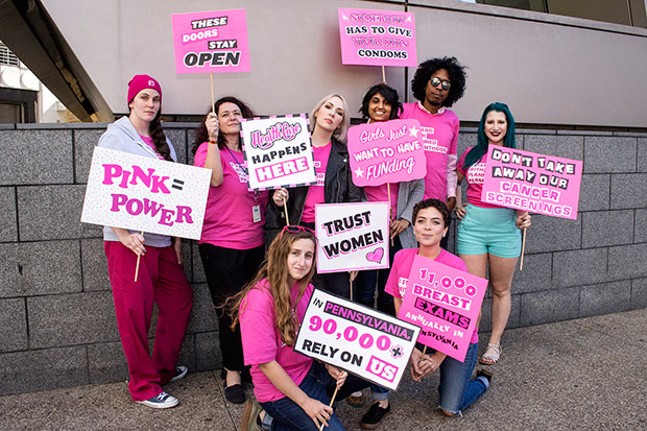Gina DeAngelo was a college student in her early twenties when she noticed a lump on her breast. She instantly had two thoughts. The first was about her grandmother who died of cancer just a few years prior; the second was her lack of health insurance.
“I was completely terrified,” DeAngelo says. Without insurance, she didn’t know where to turn to get a diagnosis, let alone what she might do if it turned out that she did have breast cancer. “I sat on it for a couple of months, alternating between feeling really stressed out and just pushing it out of my mind.”
When she finally faced it, she came up with one option: Planned Parenthood of Western Pennsylvania. On a Saturday, during walk-in hours, DeAngelo headed to the Planned Parenthood office Downtown, only to encounter a crowd of loud, angry protesters.
“They screamed at me on my way in, I was so shaken up,” she says. “It made me so mad, because it took me a really long time to get the courage up, figure out where I could go and actually go there.” DeAngelo noticed the strange juxtaposition that a lot of Planned Parenthood clients experience. Inside, “there was a group of extremely helpful people that were the only help that I had; outside, there was this big group trying to make sure that I wasn’t able to have access to that care.”
Luckily, DeAngelo did get free access to health care, thanks to Planned Parenthood. After performing a clinical exam, Planned Parenthood decided that she did need further testing and provided her with a prescription for a mammogram and a voucher that would cover the cost. After the mammogram, a needle biopsy was taken, and the eventual results were negative. DeAngelo gives Planned Parenthood the credit for her peace of mind.
Despite the countless times that Planned Parenthood has helped its clients, it has — especially in recent years — faced constant threats of having its federal funding pulled by Congress. Most of that fight is fueled by rhetoric that claims federal dollars are paying for abortions. However, that is simply not true. First, there’s no federal budget line item that “funds” Planned Parenthood. The organization receives its money largely through Medicaid reimbursements after a patient receives health-care services (about $554 million last year). Secondly, there is already a federal law known as the Hyde Amendment (passed in 1976). That law specifically prohibits federal dollars from being spent on abortion services, except in the case of rape or incest or if the mother’s life is in danger. Many women, however, see Planned Parenthood as a lifeline to medical treatment they, perhaps, wouldn’t get otherwise. If Planned Parenthood funding is shut down, the group estimates, about 1.5 million patients would be left without access to women’s health services.
Planned Parenthood’s job is to provide health care, and almost all of its clients are women. According to its 2015-2016 annual report, Planned Parenthood of Western Pennsylvania had 17,325 patient visits that year, 16,274 of them by women. Thirty-six percent of its patients accessed their services through Medicaid, and 18 percent paid according to a sliding-fee scale, which charges patients relative to their income.
“For many of our patients, Planned Parenthood is the gateway into the health-care system, and we serve some of the most vulnerable populations,” says Planned Parenthood of Western Pennsylvania Certified Nurse-Midwife Rachel Gallagher.


